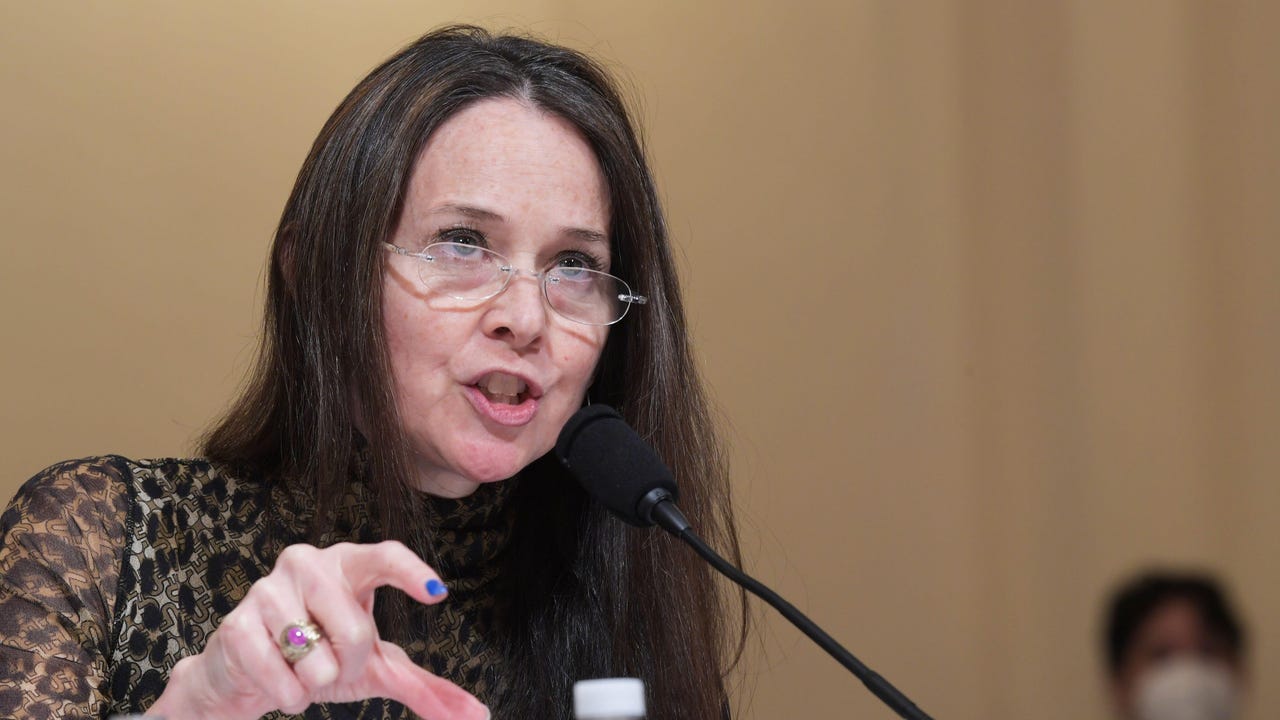What happens when a Christian relationship expert’s marriage falls apart?
For decades, Christian relationship advice has trended toward regressive ideas about gender: namely, that women should be submissive to their husbands, who in turn are the head of the household. Those ideas arguably penetrated the mainstream with the rise of the tradwife and the idyllic image of the monogamous home life she represents. Yet the […]


For decades, Christian relationship advice has trended toward regressive ideas about gender: namely, that women should be submissive to their husbands, who in turn are the head of the household. Those ideas arguably penetrated the mainstream with the rise of the tradwife and the idyllic image of the monogamous home life she represents.
Yet the romantic lives of modern Christian advice-givers are often a lot more complex than the traditional marriage roles they espouse. Millions of Christian conservative women who follow these authors seem to recognize that the writers’ imperfections are part of a longer journey toward self-improvement — a journey that might also reflect their own.
Nowhere is that contradiction more evident than in mega-successful Christian author and influencer Lysa TerKeurst.
On her way to amassing 3 million followers across social media, writing half a dozen New York Times bestsellers, and launching her own media network, TerKeurst has made messy confessionals a core part of her brand. TerKeurst spent most of the 2010s building her brand out of affirmative, Instagram-ready self-help advice, leaning heavily on the wholesome image of her family and her 25-year marriage. But then, something happened that might have been a dealbreaker for other Christian authors: TerKeurst got a divorce.
Similar episodes have damaged the careers of Christian celebrities who were branded “false teachers” and could not overcome perceptions of having sinned. TerKeurst, however, not only acknowledged her own failed relationship — she mined it for further wisdom, placing her among a new wave of Christian self-help authors, who are writing more candidly about their struggles. TerKeurst’s audience has responded by making her one of the most successful authors in the genre: She currently has not one, not two, but five books concurrently on the Evangelical Christian Publishers Association’s Christian bestsellers list.
TerKeurst’s popularity appears to demonstrate a longing for a less rigid, more forgiving view of Christian relationships, even as her fans continue to revere the idea of a traditional marriage.
TerKeurst made her vulnerability a cornerstone of her brand
For decades, the average Christian self-help book has framed marriage as a divinely ordained arrangement that’s ultimately about serving God and reifying gender roles. Classic texts like 1963’s Fascinating Womanhood and 1984’s Passion and Purity that are still popular today forward antiquated views on women (for example that man is “the initiator,” woman “the responder” and “helper”), while the purity culture that dominated the books of the ’90s continues to influence today’s authors.
From the beginning, TerKeurst was an outlier in advocating mutual partnerships in marriages — a theme well out of step with her peers.
The theme of women’s submission to men was and is ubiquitous. To get a flavor, just read a passage from Stormie Omartian’s 1996 bestseller The Power of a Praying Wife: “Lord, help me to be a good wife,” she writes. “Take my selfishness, impatience, and irritability and turn them into kindness, long-suffering, and the willingness to bear all things.”
It was into this crowded, archaic environment that TerKeurst, in the early 2000s, launched her long and determined writing career, peddling general advice aimed mainly at Christian women. From the beginning, she was an outlier in advocating mutual partnerships in marriages — a theme well out of step with her peers.
In 2002, for example, she published a pair of guides, one for men and one for women, in which she outlined her marriage philosophy. She parroted the usual evangelical tropes about submission and gender difference (one chapter of her women’s guide is titled “Boys will be boys”), but she also pointed out to men that “Your wife needs you to be her teammate in raising the kids and taking care of the home.”
TerKeurst also blogged incessantly, gradually building a following by focusing on lifestyle and dieting advice. Among her key attributes was vulnerability: In 2008, she wrote about getting an abortion a few months after she began dating her husband, and how the accompanying guilt and shame subsequently impacted her marriage.
Her breakout success didn’t come until her 14th release, 2011’s Made to Crave: Satisfying Your Deepest Desire With God, Not Food. TerKeurst’s spin on diet culture, and the divine stamp she put on the pressure to be thin, proved popular. The book wound up hitting the New York Times bestseller list, reportedly selling 200,000 copies in nine months. From there, TerKeurst became a frequent contributor to NBC’s Today, helping her reach a wider audience.
Her bite-sized, memorable aphorisms around the messages of self-image and empowerment (e.g. “those who constantly try to impress others will depress themselves”) were tailor-made for the early years of Instagram and other social media, alongside a perpetual barrage of family photos with attractive filters of her husband and their five kids. While her blog frequently embraced her struggles as a mother and wife, her social media image was a pastel montage of a cozy life of family, fabulous vacations, and famous friends, as well as loving tributes to her husband, businessman Art TerKeurst.
When things went south, she wrote her way out
From the start of her writing career, TerKeurst wrote about ongoing issues in her marriage; in 2002’s Capture Her Heart, she wrote about starting off the marriage with a host of issues and seeing multiple couples counselors without success. A decade and a half later, in a since-deleted 2017 blog post, TerKeurst revealed that her husband had been having an affair for several years, as well as experienced substance abuse. “I’ve always encouraged women to fight for their marriages and to do everything possible to save them when they come under threat,” she wrote. “So, for the past couple of years I have been in the hardest battle of my life trying to save my marriage.”
The news drew shocked reactions, but many of TerKeurst’s fans were sympathetic. “Art and Lisa TerKeurst are a fairly ‘famous’ Christian family,” one Christian blogger wrote after TerKeurst’s post announcing her divorce. “Now, through her transparency in the demise of her marriage, I have learned something about my marriage … At some point, Art TerKeurst made one bad choice that led to a slew of others. And so can I. And so can my spouse. And so can you and yours.”
Despite her intent to get a divorce, the following year the couple renewed their vows instead in a high-profile ceremony. That new recommitment didn’t last, however; in 2022, TerKeurst detailed in an Instagram post that despite ongoing efforts to repair her marriage, her husband had continued to cheat, ultimately firming her resolve to choose divorce.
“I’ve had to learn the hard way there’s a big difference between mistakes (which we all make) and chosen patterns of behavior that dishonor God and the biblical covenant of marriage,” she wrote.
TerKeurst wasn’t the only high-profile Christian advice author who was caught up in a divorce scandal through this period; Christian blogger Glennon Doyle had a similar experience in 2016, only to swiftly fall for another woman, break with evangelical culture, and start a hit liberal podcast.
TerKeurst, though, chose a less rebellious path: She continued to publish her relationship advice to her audience of Christian women looking for love in a so-called traditional marriage — only now her emphasis shifted to processing the trauma of a failed relationship. Rather than sticking out a toxic situation at all costs, she now leaned into the idea of letting God help her and her audience heal from heartbreak and betrayal while learning to set boundaries.
“We can’t enable bad behavior in ourselves and others and call it love,” she wrote in 2022’s Good Boundaries and Goodbye. “We can’t tolerate destructive patterns and call it love.” And in 2024’s I Want to Trust You, but I Don’t: “Rebuilding trust requires a combination of three things: Time, believable behavior, and a track record of trustworthiness.”
TerKeurst’s flavor of Christian self-help is becoming more and more common
This message of empowerment and insistence on the right to exit a floundering relationship is a far cry from the vast majority of Christian advice literature, with its emphasis on submission and staying in the marriage at all costs. But it’s increasingly a part of the literary and social media diet of Christian women.
“Christian women authors, as with many mainstream women authors, derive a lot of their authority from their vulnerability,” journalist Katelyn Beaty, author of Celebrities for Jesus: How Personas, Platforms, and Profits Are Hurting the Church, told Vox in an email. “Self-disclosure in the form of storytelling is a kind of credentialing.”
Writers like Rebekah Lyons and Ann Voskamp, for example, have opened up about their mental health struggles, while others like Jennie Allen have been painfully honest about their relationship struggles, such as Allen’s husband’s ongoing depression.
Overly idealized social media feeds and stories from influencers have even drawn backlash from audiences for presenting a false view of Christianity. Women are now gravitating toward influencers like TerKeurst who offer a less glossy version of their lives.
“Christian women want to feel that their favorite authors and Instagram follows are as flawed and ‘broken’ as they are,” Beaty said, “even if they still appear on social media with perfect hair, beautiful families, and fashionable clothing.”
“Christian influencers and self-help experts are still held to a high moral and spiritual standard,” she added, citing influential figures like Carl Lentz, who was fired from Hillsong Church after an affair and allegations of abusing his staff. “But authors may be held to a lower standard than people in official church and ministry leadership positions…Christians can relate strongly to a story of confessing sin, admitting brokenness, and seeking forgiveness and change.”
While TerKeurst’s embrace of her own relationship difficulties has only boosted her marketability, she isn’t without controversy. Her conservative detractors have claimed that she’s too liberal, while others have accused her of forwarding various “non-Biblical claims,” including “instructing men,” and for allying with proponents of the controversial prosperity gospel. Other critics have pointed out that her media company, Proverbs 31 Ministry, accepted $690,000 in Paycheck Protection Program loans following the pandemic, despite her lucrative income; her speaker fees alone reportedly range from $20,000 to $30,000.
In 2024, about two years after TerKeurst’s divorce announcement, she remarried and restarted newlywed life. Her books, however, are still looking backward: Her next release, due this fall, is titled Surviving an Unwanted Divorce.
TerKeurst has managed to develop a deep bond with her readers and constructed a durable fan base by strategically sharing bits of herself, knowing she wasn’t alone in her experiences. “This beautifully honest, candid and encouraging book has been a therapist, a nurse and a friend to me throughout the darkest winter of my life,” one reviewer wrote of the 2023 devotional collection You’re Going to Make It. “Thank you Lysa. By sharing your journey, you eased mine. I am very grateful.”






































































